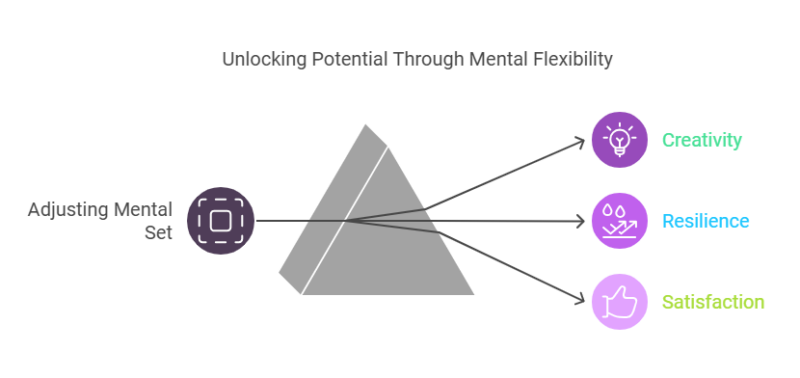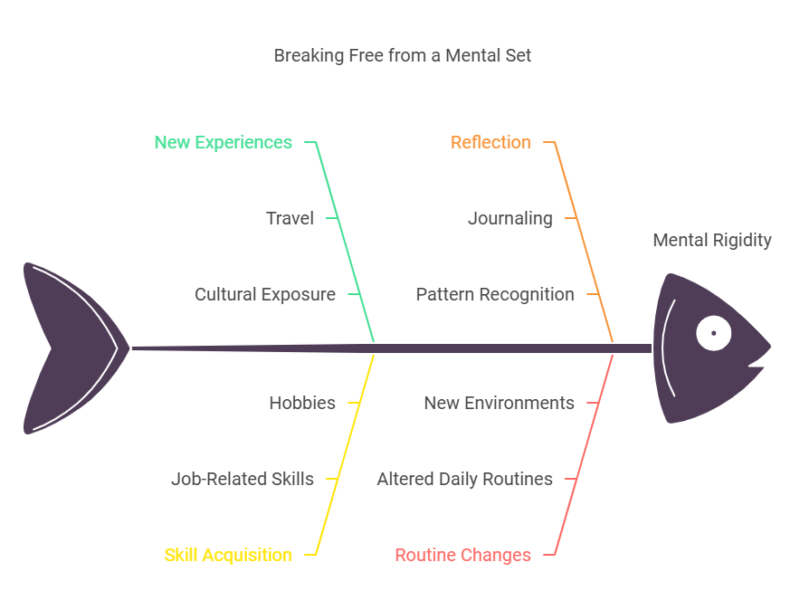Mental Set in Psychology – What It Means and How It Affects You
Today, I’m excited to chat about a concept in psychology that might sound a bit abstract at first but is super relevant to our everyday lives. I’m talking about the mental set.
Ever noticed how sometimes your usual way of thinking can either be a huge help or a stumbling block in solving problems? That’s your mental set at work.
What is a Mental Set?
@lewiscrookdotcom What is Mindset? Why does Mindset matter? What is a Growth Mindset? What is an Empowering Mindset? How to develop a Growth Mindset? #cognitivereframing #cognitiveshifting#growthmindset #mindset #mindsetcoaching #selfcompassion#cognitivebehavioraltherapy#psychologytips #psychologytools #selfconfidence #confidence #empoweringmindset
A mental set is, simply put, the go-to mindset that we automatically employ when faced with a problem. It’s formed by our previous experiences and successes, influencing our current problem-solving tactics.
As such, a mental set can both facilitate and impede our cognitive processes depending on the context.
Why It Matters

The concept of a mental set is crucial because it plays a pivotal role in both our personal and professional lives. A mental set can streamline problem-solving, making you quick and adept at navigating familiar challenges using well-trodden paths. This efficiency is particularly beneficial in high-pressure situations where quick decision-making is crucial.
Conversely, it can also lead to stagnation, as it might lock us into familiar patterns of thinking, preventing us from seeing alternative solutions that could be more effective. Over time, this can result in decreased efficiency and missed opportunities for improvement.
Examples in Daily Life
To better understand how mental sets manifest in everyday situations, consider these scenarios: Suppose you always resolve disagreements with your partner by yielding; this strategy becomes your mental set for handling conflicts, whether it’s effective or not.
While this may avoid conflict in the short term, it might also suppress genuine resolution and communication improvements.
Consider a worker who sticks to outdated software for tasks because it’s familiar, even though newer, more efficient tools are available. This reluctance to adapt can hinder productivity and innovation. In the long run, such resistance to change can limit personal growth and professional development.
How to Break Free from a Mental Set

Be Open to New Experiences
Travel! Getting out into the world and experiencing new cultures can dramatically reshape your mental set, offering new mental models and perspectives. Such experiences can challenge preconceived notions and introduce you to diverse ways of thinking and solving problems.
Learn new skills
Picking up new skills, whether related to your job or a hobby, can dramatically shift how you approach problems and decisions. This can enhance your ability to innovate and adapt to new challenges.
Reflect on Your Thinking Patterns
Keeping a journal allows you to track your thought processes and identify recurring patterns that might be shaping your mental set. Reviewing this journal can provide insights into how your thoughts align with your outcomes, helping you to make necessary adjustments.
Challenge Yourself Regularly
Solve puzzles and brain teasers. Engaging regularly with activities that challenge your cognitive norms can foster flexibility in your thinking. This constant mental exercise can prevent cognitive rigidity and promote mental agility.
Switch up your routines
Altering daily routines can stimulate your brain in new ways, possibly leading to insights and solutions that would remain undiscovered otherwise. Changing your environment or workflow can provide new stimuli and ideas, contributing to a more dynamic mental framework.
Benefits of Adjusting Your Mental Set

Adjusting or expanding your mental set can significantly enhance various aspects of your life, from your creativity to your emotional resilience. Here’s what you stand to gain:
- Creativity: Openness to new experiences and breaking out of your mental routine can lead to innovative ideas and creative solutions. This can be particularly useful in fields that value continuous innovation and adaptive strategies.
- Resilience: Being adaptable in the face of challenges strengthens your ability to cope with stress and recover from setbacks. It also prepares you to face unforeseen challenges with a more versatile toolkit.
- Satisfaction: There’s profound satisfaction in solving problems or overcoming challenges in ways you hadn’t considered before. This can lead to a greater sense of personal accomplishment and motivation.
In Summary
Take a moment today to think about how your own mental set might be influencing your decisions and consider whether there might be a better approach to some of your recent challenges.




